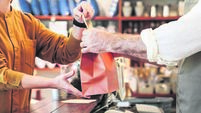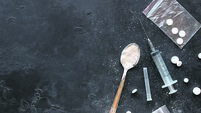Kathriona Devereux: Suffer little children... Covid is widening school inequality gap

I guessed “a herd of giraffes”. I was wrong. I even went off and checked Google to be sure, but my Senior Infant was right. The pack of long-necked lads hanging out in Fota can be described as “a tower of giraffes”.
I also didn’t know that some of the shopkeepers in my neighbourhood have a decent level of Irish and, along with milk and a few vegetables, can facilitate a real life Gaeilge lesson.
When I asked “Cé mhéad é sin?” the siopadóir said “deich euro”. I said “Go raibh maith agat”, “ná habair é” was the reply. My Senior Infant was very impressed that the ‘Céim ar Chéim’ schoolbook had real world application.
The American education reformer John Dewey famously said that “education is not preparation for life; education is life itself”, and with the full reopening of schools still weeks away, we have to take ‘learning’ anywhere we can.
I’m categorising lots of mundane household tasks as ‘important life skills’. Hoovering, peeling carrots and cleaning the fluff out of the lint trap in the tumble dryer are all “important life skills” that are taught regularly at Scoil Náisiúnta na Tuismitheoirí.
Scissoring an old magazine into thousands of tiny pieces is not an important life skill, but it does keep the pre-schooler occupied for 30 minutes so I’ll tolerate the five minutes of clean up afterwards.
If I’m really lucky, the desire for hoovering might coincide with cleaning up the magazine mess and I feel like I should be presented with a parenting award.
Baking brown bread ticks the reading, counting, fine motor and ‘important life skills’ boxes and I use it as a personal exercise in mindfulness by embracing the achingly slow pace of flour being spooned into the weighing scales and inevitable spilled flour, milk and eggs. But hey, it soaks up 30 minutes of the day and we have something wholesome to eat for lunch.
A colleague of mine recently informed me of the term ‘brown bread telly’ — educational kids programming that is practically good for them. There are lots of shows on RTÉ Jr that fall into that category. We have devoured series of the Body Brothers, Wonder What? and Let’s Find Out and now appreciate the intricacies of jam-making, wastewater treatment plants and an octupus’s nine brains!
A recent report by the National Social Justice Committee of the Society of St Vincent de Paul highlighted some of the issues. Access to space and technology to allow for online homeschooling is not available to all children.
“Many students are unable to keep up with their schoolwork because they do not have space or the right technology for online learning. For many households struggling on a low income, having a laptop and broadband is a luxury, not a necessity.”
The SVP argues that it is vital for the Department of Education to support children to prevent further educational disadvantage because of Covid-19 restrictions.
The report recommends that, during school closures, special consideration should be given to children and young people in emergency accommodation, in direct provision and those at risk of early school leaving.
Critically, when schools do reopen, the SVP recommends that resources are provided to help students who have experienced significant learning loss to catch up. It suggests 1:1 tuition support or extra learning support teaching hours for children who have fallen behind educationally. Or free summer camps for children experiencing disadvantage.
The SVP report also highlights the need for greater resourcing of the Child and Adolescent Mental Health Service and National Educational Psychological Service. A plea that is echoed continually by many other support organisations.
Each sector of society has struggled with Covid-19 in different ways, but the shutting of schools has had a deep effect on children and young people, particularly those at the milestone transition points of finishing primary school and starting secondary school or finishing 6th year and starting third level education.
The whole mess of the Leaving Cert adds a special layer of stress and uncertainty for students.
Quality education is recognised as a key factor in addressing poverty and inequality. “Ensure inclusive and equitable quality education and promote lifelong learning opportunities for all”, is one of the United Nations’ sustainable development goals.
At least a third of the world’s children do not have the technology they need to participate in remote learning.
The pandemic has also resulted in an increase in educational inequalities, with a completion rate of 79% for the well off households and 34% for poor households.
This is not just a problem for low income countries, children living in rich countries like Ireland are represented in those numbers, which is why, when schools reopen, we have to redouble our efforts to help those kids catch up and close the education inequality gap.







 App?
App?




